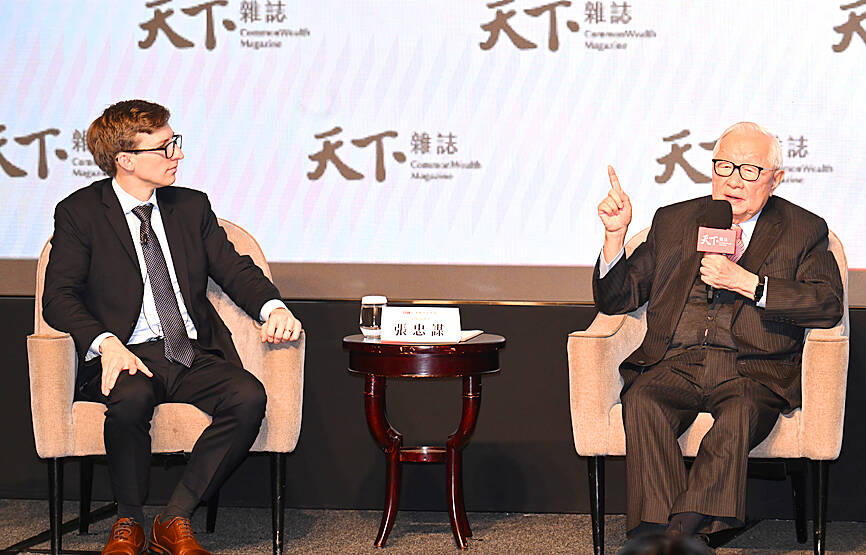Washington’s efforts to on-shore semiconductor production might lead to surges in chip prices and supply bottlenecks, Taiwan Semiconductor Manufacturing Co (TSMC, 台積電) founder Morris Chang (張忠謀) said yesterday.
The 91-year-old industry veteran said he supports parts of Washington’s effort to slow China’s progress on advanced chip manufacturing.
China is still six years behind Taiwan in making advanced chips, despite years-long efforts to catch up, Chang told a Commonwealth Magazine forum that he coheadlined with Tufts University assistant professor Chris Miller, an expert on the US-China rivalry’s effects on chip manufacturing.

Photo: Tien Yu-hua, Taipei Times
However, Chang said that other parts of the effort, particularly Washington’s on-shoring and friend-shoring policies, perplexed him.
The US already holds a lion share of 39 percent in the semiconductor sector, including chip manufacturing equipment, chip design and intellectual property, he said.
Washington has excluded Taiwan from its friend-shore list, Chang said, citing US Secretary of Commerce Gina Raimondo as saying that Taiwan is a dangerous place and the US cannot rely on it for chip supply.
"It is, I think, Taiwan's dilemma," Chang said.
However, Raimondo has not made any remarks on the issue since TSMC unveiled plans to set up fabs in the US, with investment totaling US$40 billion, he said.
Chang said he is not sure what the US wishes to achieve through its on-shoring and friend-shoring policies.
“On-shoring is in the name of security and resiliency,” Chang said, adding that even though the defense industry only needs an insignificant amount of chips, the US wants to build large domestic capacity.
The US already has 11 percent share of the world semiconductor manufacturing, he said.
“If you give up the competitive advantages of Taiwan and move to the US ... the costs are going up,” Chang said.
Chang previously estimated that chip manufacturing costs in the US would be 50 percent higher than in Taiwan.
“I found out that was an underestimate. Perhaps, a far worse underestimate than I was underestimated,” Chang said, referring to Miller’s book Chip War: The Fight for the World’s Most Critical Technology, in which the professor writes that Chang is the most underestimated businessperson of the past few decades.
Chipmaking costs in the US could be twice those in Taiwan, Chang said.
“That is going to have some impact on the further expanding ubiquity of the chips. That is one thing I can see. When the costs go up, the ubiquity of chips will either stop, or slow down considerably,” he said, calling chips the most “disinflationary item” of the past six decades.
Taiwan’s competitive advantages in chipmaking are based on its work culture, Chang said, citing his experience working for Texas Instruments Inc in the US from 1958 to 1983.
If a chipmaking tool at a Taiwanese fab breaks at 1am, it is replaced by 2am, he said.
In the US, the same issue would not be solved until the next day, he added.

A magnitude 7.0 earthquake struck off Yilan at 11:05pm yesterday, the Central Weather Administration (CWA) said. The epicenter was located at sea, about 32.3km east of Yilan County Hall, at a depth of 72.8km, CWA data showed There were no immediate reports of damage. The intensity of the quake, which gauges the actual effect of a seismic event, measured 4 in Yilan County area on Taiwan’s seven-tier intensity scale, the data showed. It measured 4 in other parts of eastern, northern and central Taiwan as well as Tainan, and 3 in Kaohsiung and Pingtung County, and 2 in Lienchiang and Penghu counties and 1

FOREIGN INTERFERENCE: Beijing would likely intensify public opinion warfare in next year’s local elections to prevent Lai from getting re-elected, the ‘Yomiuri Shimbun’ said Internal documents from a Chinese artificial intelligence (AI) company indicated that China has been using the technology to intervene in foreign elections, including propaganda targeting Taiwan’s local elections next year and presidential elections in 2028, a Japanese newspaper reported yesterday. The Institute of National Security of Vanderbilt University obtained nearly 400 pages of documents from GoLaxy, a company with ties to the Chinese government, and found evidence that it had apparently deployed sophisticated, AI-driven propaganda campaigns in Hong Kong and Taiwan to shape public opinion, the Yomiuri Shimbun reported. GoLaxy provides insights, situation analysis and public opinion-shaping technology by conducting network surveillance

‘POLITICAL GAME’: DPP lawmakers said the motion would not meet the legislative threshold needed, and accused the KMT and the TPP of trivializing the Constitution The Legislative Yuan yesterday approved a motion to initiate impeachment proceedings against President William Lai (賴清德), saying he had undermined Taiwan’s constitutional order and democracy. The motion was approved 61-50 by lawmakers from the main opposition Chinese Nationalist Party (KMT) and the smaller Taiwan People’s Party (TPP), who together hold a legislative majority. Under the motion, a roll call vote for impeachment would be held on May 19 next year, after various hearings are held and Lai is given the chance to defend himself. The move came after Lai on Monday last week did not promulgate an amendment passed by the legislature that

AFTERMATH: The Taipei City Government said it received 39 minor incident reports including gas leaks, water leaks and outages, and a damaged traffic signal A magnitude 7.0 earthquake struck off Taiwan’s northeastern coast late on Saturday, producing only two major aftershocks as of yesterday noon, the Central Weather Administration (CWA) said. The limited aftershocks contrast with last year’s major earthquake in Hualien County, as Saturday’s earthquake occurred at a greater depth in a subduction zone. Saturday’s earthquake struck at 11:05pm, with its hypocenter about 32.3km east of Yilan County Hall, at a depth of 72.8km. Shaking was felt in 17 administrative regions north of Tainan and in eastern Taiwan, reaching intensity level 4 on Taiwan’s seven-tier seismic scale, the CWA said. In Hualien, the